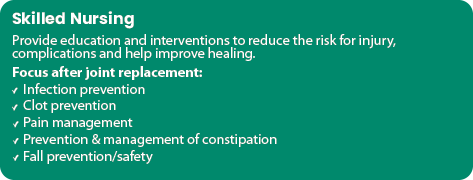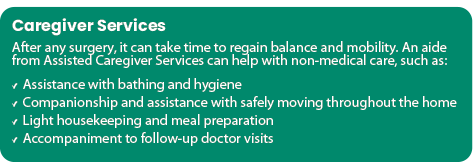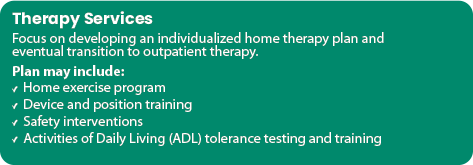Disease Type
While returning home from Joint Replacement Surgery is a relief, worrying about post-surgical care during the recovery phase can be stressful. Patients often feel tired, uncomfortable, and in pain after surgery and may require assistance completing tasks of daily life, such as preparing meals, walking, or bathing. However, hospitals will not discharge patients without ensuring proper arrangements involving professional support -such as Assisted Home Health- are made. In addition, planning post-surgical care ahead of joint replacement can aid in speeding up your recovery at home.
Joint replacement surgery is a procedure that involves the complete removal of a damaged or arthritic joint and replaces it with an artificial joint (Prosthesis) typically made of metal, ceramic, or plastic materials. The goal of surgery and the new joint is to relieve pain and improve quality of life. Knee and hip replacements are the most common, but replacement surgeries for other joints can also be performed, including the ankle, wrist, shoulder, and elbow.
How Assisted Cares
Assisted understands surgical recovery experiences vary; therefore, care is customized based on personal needs and physician instructions. Our highly trained Nurses, Home Health Aids, Physical Therapists, and Occupational Therapists can provide the care and support needed to help you recover in your own home comfortably and safely.
Skilled Nurses
After surgery, you may be prescribed medication to reduce pain and swelling as well as medication to prevent blood clots. Your physician will also provide specific instructions regarding wound care, pain management, diet, and exercise to ensure proper healing and to avoid hospitalization due to injury or falling. Assisted Nurses can identify signs and symptoms of infection, help with mobility exercises, and encourage the intake of a balanced diet. Other services may include:
- Administering Medication or Antibiotics
- Wound Care
- Monitor Changes at the Incision Site
- Provide Positive Reinforcement
- Assess the Safety of the Home
Help at Home
As with any major surgery, it can take time to regain balance and start moving around without assistance. A home health aide can help with simple chores during recovery. Assisted Home Health Aides will support your daily hygiene needs, such as bathing and grooming, toileting, and getting dressed. They can also assist with meal preparation and light housekeeping, including doing the dishes after dinner.
Physical and Occupational Therapy
Additionally, you will require physical therapy to regain strength and promote healing. It will also help prevent complications like blood clots or prosthesis malfunction. Our Physical Therapists help patients regain as much strength and mobility as possible with an assessment to determine the patient’s current medical condition. They will show you how to get in and out of bed and how to use crutches or a walker safely, as well as how to maintain balance and create a home exercise program custom to your needs.
Occupational Therapists can help you regain fine motor skills. These skills involve activities of daily living such as bathing, cooking, and getting dressed safely. In addition, upon completion of the joint replacement surgery, occupational therapy helps patients gradually recover their full range of motion and regain their strength.
Joint replacement surgery and recovery can be challenging, but successful recovery is achievable with a proper treatment plan, patience, time, and a supportive care team. If you are in the process of Joint Replacement Surgery and need help after you are discharged, visit us at www.AssistedCares.com or call 800-949-6555 to learn more about how we can help.
Joint Replacement Tips for Healing at Home
Check out the following video to explore ways to support joint replacement recovery at home.
Need Help? Call Our Professional Staff Now...800-949-6555
Awards and Certifications
Top Agency

Association of America


The owner of this website has made a commitment to accessibility and inclusion, please report any problems that you encounter using the contact form on this website. This site uses the WP ADA Compliance Check plugin to enhance accessibility.









